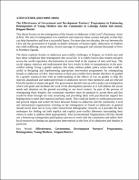| dc.description.abstract | ATIM ESTHER (2010-M093-10010)
The Effectiveness of Government and Development Partners’ Programmes in Enhancing Reintegration of Young Mothers into the Community in Labongo Amida Sub-county, Kitgum District
This thesis focuses on the reintegration of the female ex-abductees of the Lord‟s Resistance Army (LRA). The aim of reintegration is to transform and empower these women and girls so that they can help themselves and have a successful future. For more than two decades, the war between the LRA and the government of Uganda included violations of human rights, abductions of children into child soldiering, sexual abuse, forced marriage of young girls and claimed thousands of lives in Northern Uganda.
The thesis explores female ex-abductees post-conflict challenges in Kitgum, an Acholi area and how these complicate their reintegration into social life. It is widely known that women and girls across the world experience discrimination of some kind at the expense of men and boys. The social stigma, rejection and maltreatment they face results in their re-traumatisation in the post-conflict setting. Using a gender analysis, this study outlines public policy action that could be useful in designing and implementing appropriate intervention programmes for reintegrating female ex-abductees of LRA. Interventions in their post-conflict lives should, therefore, be guided by a gender analytical lens with an understanding of the effects of war on gender to help the rejected, abandoned and maltreated female ex-abductees recover their memories and are relieved from the burden of shame and guilt. The government should come up with a policy on reintegration which will guide and facilitate the work of the development partners as it will address the actual needs and situation on the ground according to our local context. As part of the process of reintegrating these females, the community members must be prepared to accept them and this would be done through not only sensitising and providing them with psychosocial support but helping them to meet their material and basic needs. This could aid family re-unification processes and prevent stigma and scatter the fears between female ex-abductees and the community. Local and international organisations working on the reintegration of female ex-abductees in general should invest more not in every other research but ethnographic research, as it provides the best techniques for finding out both implicit and explicit post-conflict dilemmas surrounding their clients in order to address them appropriately. Non-Governmental Organisations (NGOs) should use a bottom-up reintegration participatory process to work with the community and utilise their local resources in finding out appropriate interventions in the lives of ex-abductees and females in particular.
Key Words: Effectiveness, Government, Development Partners’ Programmes, Reintegration, Young Mothers, Kitgum District. | en_US |


